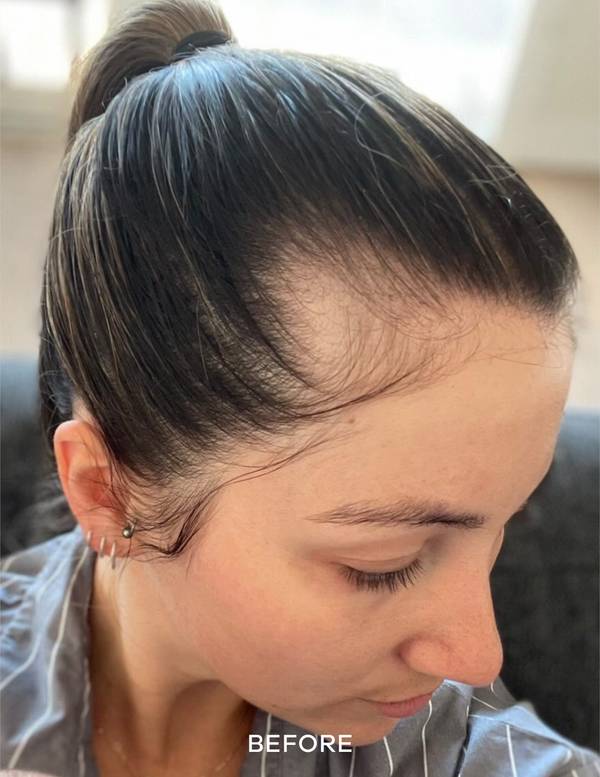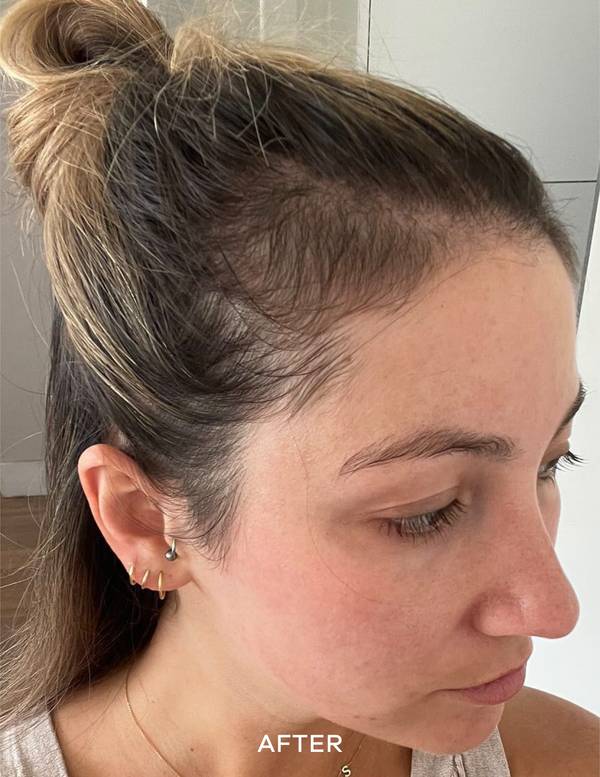Collagen, pregnancy and post-partum hair loss

Collagen, pregnancy and post-partum hair loss
Navigating pregnancy or the postpartum journey can mean significant adjustments for our body, diet and beauty routines, as it undergoes drastic changes in order to support new, growing life. And naturally, these internal shifts can be simultaneously remarkable and frustrating – with common concerns for women centred around skin and hair health.
We know the science behind marine collagen supplementation is there, however can its tangible benefits across hair, skin and nails be safety implemented into a pre or post-partum woman’s daily regime? Here, we answer your questions on collagen supplementation during and after pregnancy and how it can even support post-partum hair loss.
Can you take collagen when pregnant?
Pregnancy is linked with an increased requirement for nutrients necessary for foetal growth and development, as well as physiological changes that can be reflected in our hair and skin health. And whilst many of our customers have been able to take our Natural Marine Collagen throughout pregnancy and breastfeeding, clinical testing has only been done on non-pregnant women.
That said, we always recommend speaking to your healthcare practitioner prior. This is simply to ensure that any supplements, including our products, are right for you and your individual needs during this time.
Is collagen safe to take during pregnancy?
As the most abundant protein in the body, collagen sets the foundation for thriving hair, skin, nails and joints. And as a heightened time of nutritional needs, it is not uncommon for some pregnant women to safely supplement protein powders to temporarily fill nutritional gaps and meet daily protein needs. Likewise, as a pure protein, collagen, could also be taken during pregnancy without much concern. The underlying point of contention regarding the safety of collagen supplementation during and after pregnancy is predominantly around the risk of heavy metal consumption.
Vida Glow’s Natural Marine Collagen is subject to over 300 stringent safety and quality checks – and is tested for heavy metals including arsenic, lead and mercury. Every batch is sifted, filtered and purified four times during production to ensure it is free of containments like microplastics and is certified 100% safe for human consumption. And we also hydrolyse our marine collagen, so you get the most bioavailable supplement with the right amino acid profile necessary to elicit tangible benefits.
Can you take collagen while breastfeeding?
While there is no substantiated evidence available suggesting that post pregnancy collagen supplementation can be harmful to either a breastfeeding mum or her baby, clinical evidence is lacking. However, collagen is a naturally occurring substance found in animal products and is made up of amino acids, which our bodies need and utilise regularly.
And we know our body’s ability to produce collagen depletes with age – so in tandem with the significant changes we experience pre and post-partum (including breastfeeding) – it is said that pregnancy collagen supplements can potentially be beneficial in supporting these immense amount of changes that the body undergoes. Delivering the necessary bioavailable peptides and amino acids essential for collagen production.
Causes of postpartum hair loss
Postpartum hair loss, also known as postpartum alopecia or postpartum shedding, is common in many women after giving birth. It typically happens in the months following childbirth and can be attributed to several factors
Hormonal Changes
During pregnancy, increased levels of hormones, such as estrogen and progesterone, can prolong the growth phase of the hair cycle and reduce hair shedding. After giving birth, these hormone levels drop rapidly, causing a shift in the hair cycle. This change can lead to increased hair shedding.
Telogen Effluvium
Postpartum hair loss is often categorised as telogen effluvium, a type of hair loss that occurs when a significant number of hair follicles enter the telogen (resting) phase simultaneously. This is due to hormonal fluctuations and can result in noticeable hair loss.
Nutritional Deficiencies
Pregnancy and breastfeeding can deplete the body of certain nutrients, and this, in combination with the added stress of childbirth, can affect hair health. Nutrient deficiencies, particularly iron, zinc, and biotin, can contribute to hair loss.
Stress
Giving birth and taking care of a newborn can be physically and emotionally taxing. Stress is a known factor in hair loss, and the stress associated with childbirth and postpartum care can exacerbate hair shedding.
Thyroid Changes
Some women experience thyroid-related issues during and after pregnancy. Both an overactive thyroid (hyperthyroidism) and an underactive thyroid (hypothyroidism) can impact hair health and contribute to hair loss.
Treatment options for postpartum hair loss
Post-partum hair loss is a normal part of the pregnancy journey. And while there is no definitive treatment for postpartum hair loss, there are measures and steps you can take to help your hair feel further and prevent further hair loss - such as hair-supportive supplements and vitamins, diet, reducing the use of heat and damaging products, as well as volumising and growth shampoos and conditioners.
Natural remedies
Maintaining a healthy diet is an important factor for optimal health and wellbeing, For postpartum women, a healthy diet can help support your overall recovery and stop postpartum hair loss from progressing.
Supplements
Supplementation can be an affective support in your postpartum journey if struggling with hair loss. Your body is undergoing several changes, and with hormone and vitamin fluctuations, hair loss is common. As the building block of hair, skin and nails, supplements like a marine collagen could offer benefits in promoting thicker hair and less shedding.
Preventing postpartum hair loss
Unfortunately, there is no firm way to stop postpartum hair loss from occurring. But with education and understanding, you can better prepare with supportive steps and actions that can help you manage should postpartum hair loss occur.
Is collagen an effective postpartum hair loss treatment?
During pregnancy, women experience a considerable rise in hormones, which in fact prolongs the hair growth stage. Meaning there are fewer hairs in the resting stage of the hair growth cycle and therefore, less falling strands. However, after giving birth, estrogen levels rapidly drop and for some women, this can result in sudden and excessive hair loss – which we know as postpartum hair loss.
And finding a postpartum hair loss treatment can be a frustrating and disheartening journey. Though, there is evidence that suggests the tangible effects of collagen on hair. Collagen is rich in proline – the vital component of keratin, which is the protein that makes up your hair. As a collagen powder, Vida Glow’s Natural Marine Collagen strengthens the collagen matrix – supplying your body with the foundational peptides it needs to create an optimal hair growth environment. And with real, tangible results to show for it. Including more and longer baby hairs and faster-growing hair long-term.
Clinically proven results
Vida Glow’s Natural Marine Collagen is clinically proven to deliver visible results in as soon as 8 weeks. Our formula has been rigorously tested for quality, purity and safety, however, we still advise speaking with your GP or a healthcare professional to confirm the safe implementation of Natural Marine Collagen into your beauty routine.







